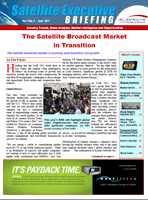GVF Appoints New Members of their Board of Directors
London, UK, December 16, 2014--The GVF has appointed five members to its Board of Directors. Joining the Board are Yasir Hassan of the Arab Satellite Communications Organization (ARABSAT) and Michael DeMarco of Intelsat; re-elected to the Board are Arunas Slekys of Hughes Network Systems, Jonas Eneberg of Inmarsat, and Nancy Eskenazi of SES. The five elected Directors join two seated Board Members: Simon Gray of Eutelsat and Timothy Shroyer of General Dynamics’ SATCOM Technologies.
"As the satellite communications industry addresses major challenges and opportunities, the need for a strong, well-credentialed GVF Board has never been greater,” said David Hartshorn, Secretary General of GVF. “The industry has chosen these leaders based upon their outstanding track records, as well as their vision and commitment to strengthening every link in the value chain.”
The GVF Board elections were held at the Annual General Meeting on 3 December in London at the Strand Palace Hotel, in conjunction with the GVF High Throughput Satellite Roundtable. Delegates participated in two days of open-forum discussion on new trends, opportunities and challenges that are key priorities on the Board of Directors’ agenda. Those priorities include the following:
Protecting Satellite Spectrum: As global efforts by the wireless industry to secure access to fixed and mobile satellite spectrum continue, GVF leads the Satellite Spectrum Initiative, campaigning with key industry leaders to increase global advocacy efforts and activities in preserving critical spectrum for use by the satellite communications industry and stakeholders. (www.satellite-spectrum-initiative.com)
Cyber-Security Best Practices: To strengthen stakeholder efforts in defending against growing cyber threats, GVF has been making strides in advancing a ‘culture of security’, establishing security guidelines for operators and enterprises, and developing compliance processes based on cyber-security best practices for the satellite communications industry. (www.gvf.org)
Building Core Competencies: Improving the skills and knowledge of technicians and operators is a strategic necessity for the industry and its customers. With tremendous increases in the number of earth stations now being installed each month, the need to train and certify technicians is increasing exponentially. GVF’s Certification program has already enrolled more than 10,000 trainees worldwide, and is expanding to provide training for broadcasting, maritime, oil & gas, emergency management, and other user groups. (www.gvf.org/training/training.html).
Promoting Quality Products: As satellite communications have become increasingly popular, the industry has seen tremendous growth in terminal manufacturing, with a proliferation of product types becoming available. GVF’s Quality Products Framework facilitates effective testing and type-approvals processes, while promoting best practices in design and production. (www.gvf.org/approvals.html)
Improved Market Access and Regulation: New reforms are needed to enable a more cost-effective operating environment. It is necessary to facilitate expanded access to affordable satellite-based services worldwide, and to monitor and act upon licensing conditions that threaten market access to satellite communications. The GVF Regulatory Working Group is diligently working to promote progressive reforms to insure affordable, easily accessible service for users worldwide. (www.gvf.org/regulatory.html)
Cultivating Operational Effectiveness: As the satellite industry has grown with unparalleled demand for mobility, high-throughput and other state-of-the-art satellite solutions, GVF has been driving satellite-industry programmes to implement network validation, benchmarking and other interference prevention and mitigation initiatives that are designed to enhance signal quality and operational effectiveness. (www.gvf.org)
Industry Advocacy & Outreach: From disaster preparedness to community connectivity, and from oil & gas to maritime, mining, military and bridging the ‘Digital Divide’, the importance of effectively communicating the satellite industry’s value and contributions is greater than ever before.





